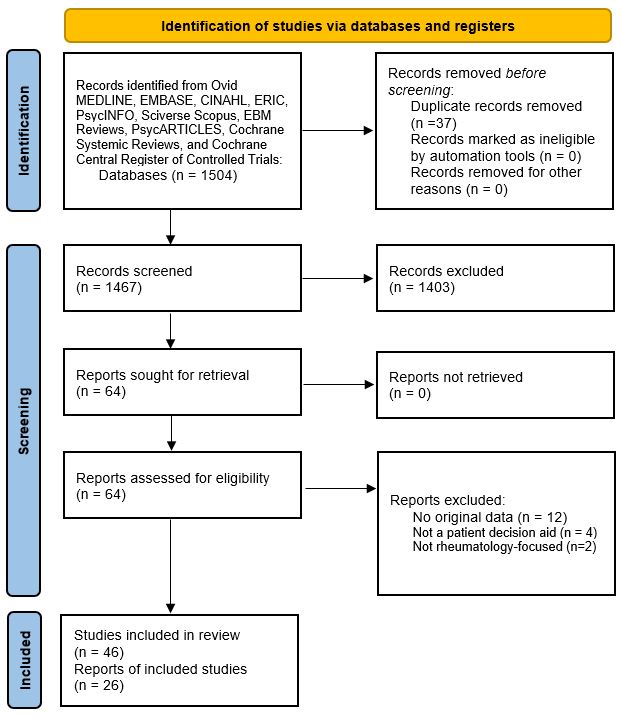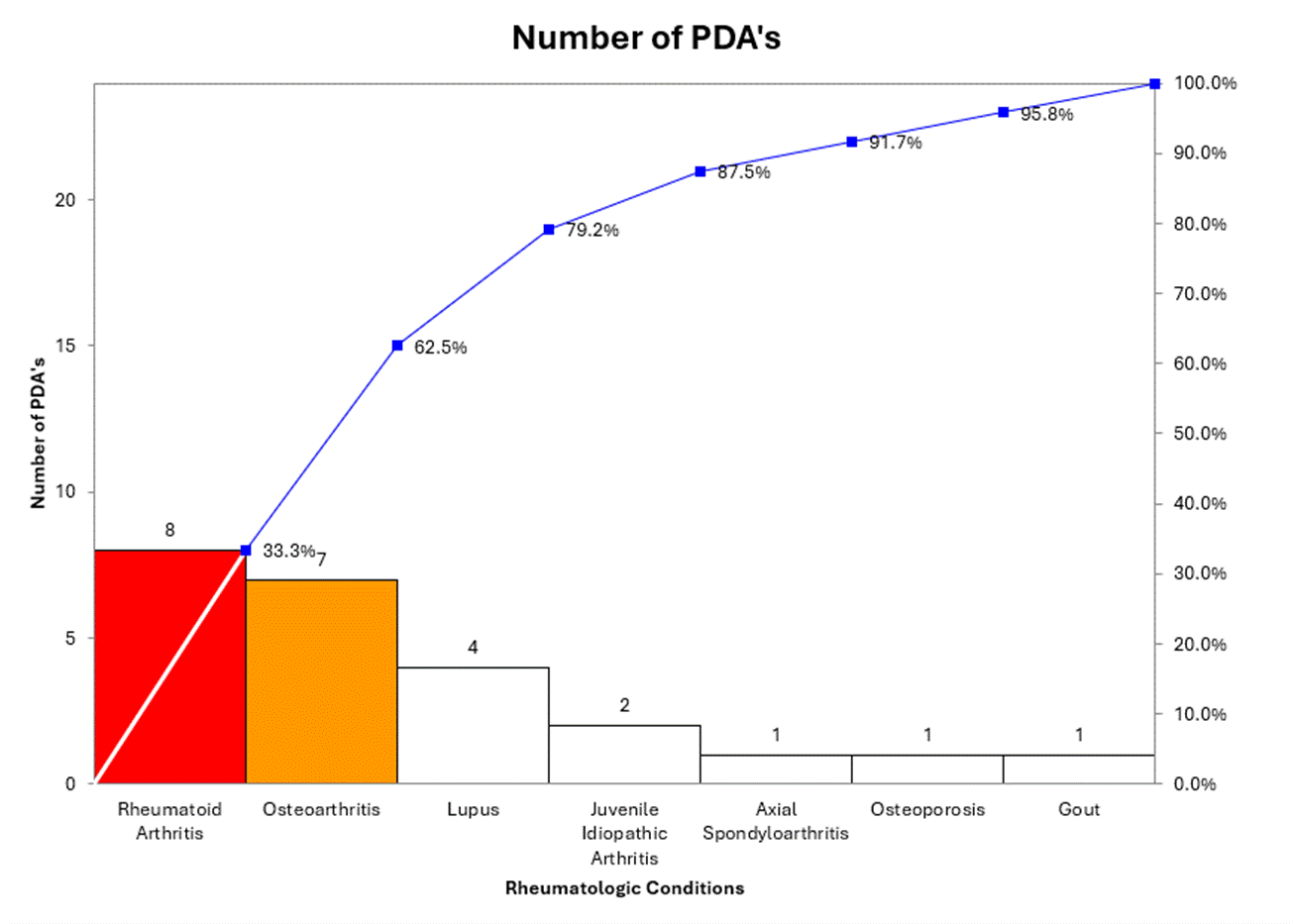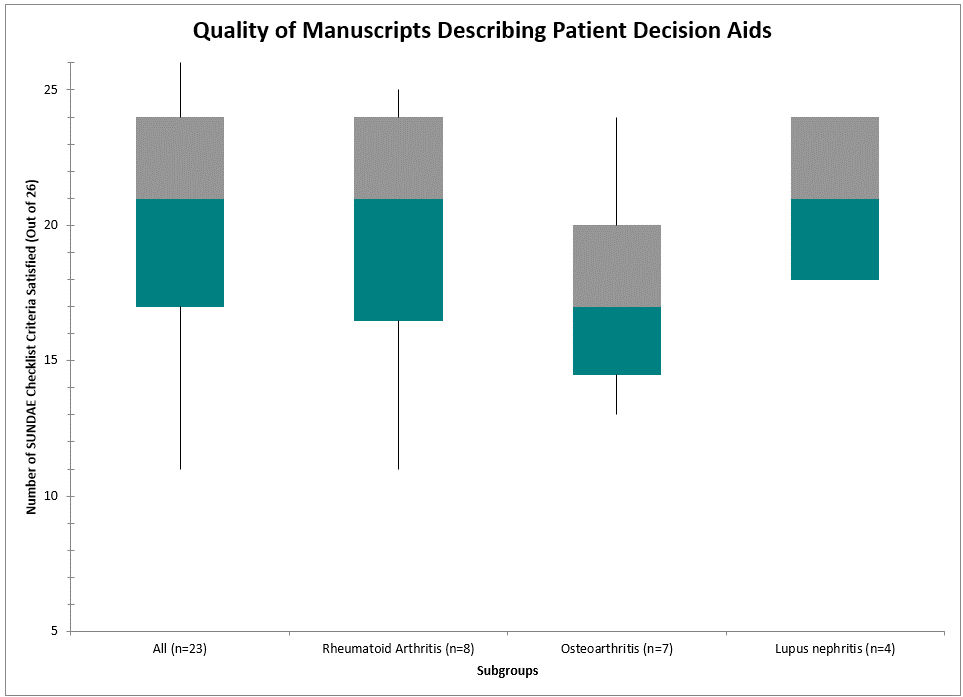Session Information
Session Type: Poster Session A
Session Time: 10:30AM-12:30PM
Background/Purpose: Shared decision-making (SDM) is a process in which patients and clinicians work together to make health care decisions. Purposeful SDM (PSDM) is a problem-based approach that emphasizes the multifaceted nature of SDM in response to different settings and contexts. The PSDM Framework highlights 4 modes of SDM, namely: Weighing treatment options (Mode 1), Negotiating intra- or interpersonal conflict (Mode 2), Problem-solving multiple competing demands (Mode 3), and Developing existential insight (Mode 4). In this integrative review, we systematically identify rheumatology patient decision aids (PDA’s) described in peer-reviewed published literature, characterize which conditions they address, and assess how they support purposeful SDM.
Methods: Articles were identified through a search of Ovid MEDLINE, EMBASE, CINAHL, ERIC, PsycINFO, Sciverse Scopus, EBM Reviews, PsycARTICLES, Cochrane Systemic Reviews, and Cochrane Central Register of Controlled Trials from 1948 to 2023. Additional sources were identified through contacting authors and scanning references. The research team analyzed patient decision aids through the Purposeful SDM Framework and classified them into one of four modes. Additionally, research team members utilized the SUNDAE Checklist (Standards for UNiversal reporting of patient Decision Aid Evaluation), a 26-item checklist to assess the quality of manuscripts evaluating the use of these PDA’s.
Results: 46 records were identifying meeting the inclusion criteria. Among the 26 articles that contained original data regarding PDA’s, there were 23 patient decision aids. The most common conditions represented include rheumatoid arthritis (n=8), Osteoarthritis (n=7), and lupus nephritis (n=4). Among the 23 total PDA’s, 19 addressed weighing treatment options (Mode 1), while 2, 2, and 1 addressed ‘Negotiating intra or interpersonal conflict’ (Mode 2), “Problem-solving multiple competing demands” (Mode 3), and “Developing existential insight” (Mode 4), respectively. The quality of publications evaluating the PDA’s varied considerably. The median number of criteria satisfied was 21 (out of 26), with considerable variation (mean: 20.3+4.4).
Conclusion: The vast majority of rheumatology-specific PDA’s support SDM with respect to weighing treatment options (Mode 1) with very few addressing other modes of shared decision-making. Among conditions, rheumatoid arthritis, osteoarthritis, and lupus nephritis are the prime foci of PDA’s. Manuscripts describing the development, evaluation, and delivery of PDA’s in rheumatologic conditions tend to be fairly high in quality, per the SUNDAE Checklist, but with great variability. Altogether, our review suggests that there exist opportunities to develop and refine tools that (1) address other modes of shared decision-making beyond weighing treatment options, (2) cover a wider variety of rheumatologic conditions, and (3) more transparently report evaluation of PDA content, development, and delivery.
To cite this abstract in AMA style:
Oke I, Ni R, Kumar B. How Do Patient Decision Aids Enable Purposeful Shared Decision-Making in Rheumatology? An Integrative Review [abstract]. Arthritis Rheumatol. 2024; 76 (suppl 9). https://acrabstracts.org/abstract/how-do-patient-decision-aids-enable-purposeful-shared-decision-making-in-rheumatology-an-integrative-review/. Accessed .« Back to ACR Convergence 2024
ACR Meeting Abstracts - https://acrabstracts.org/abstract/how-do-patient-decision-aids-enable-purposeful-shared-decision-making-in-rheumatology-an-integrative-review/



